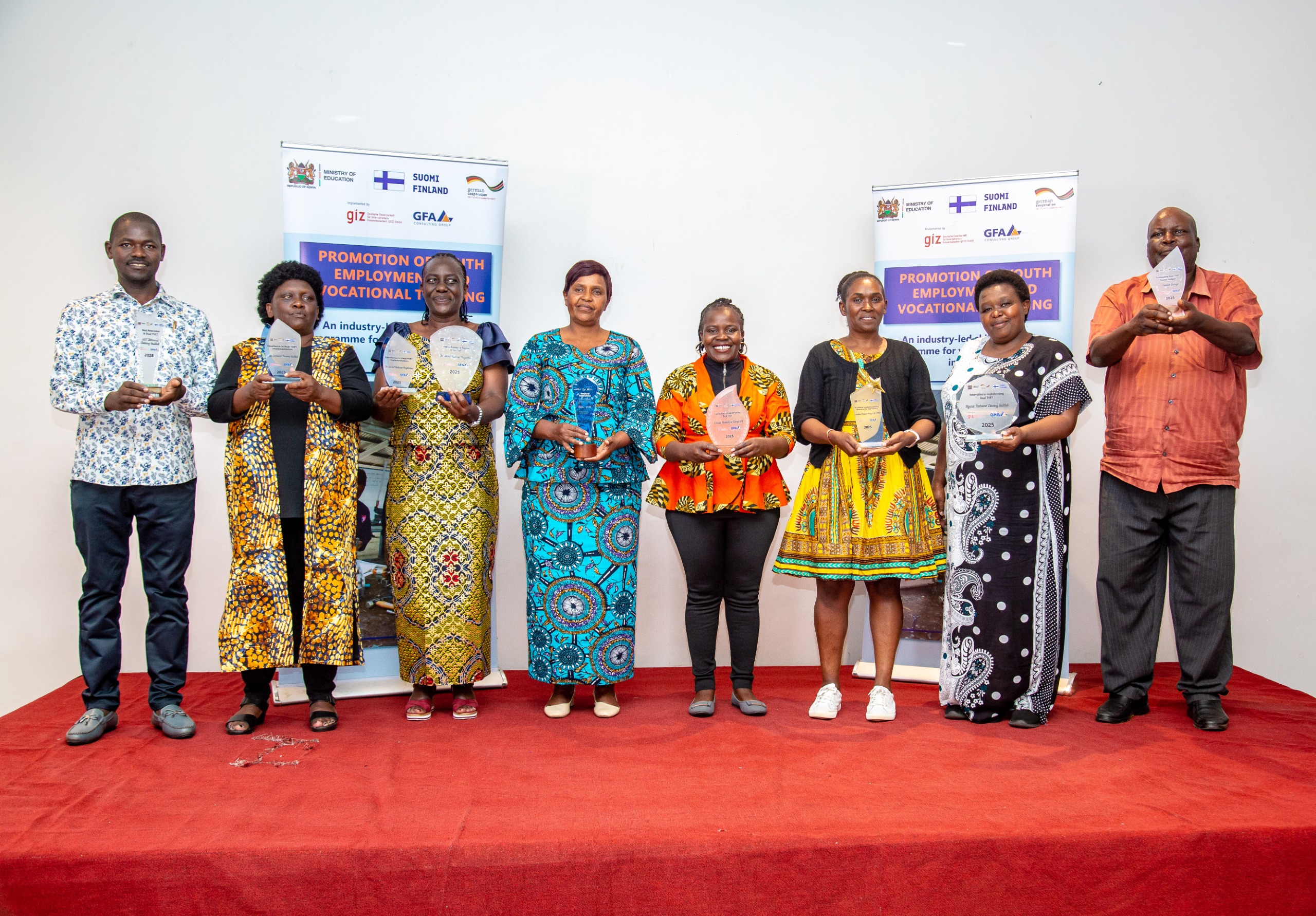
 Representatives from TVET Institutions and industries across the Rift Valley region proudly display their awards during the dual training stakeholders forum gala dinner in Eldoret City./HANDOUT
Representatives from TVET Institutions and industries across the Rift Valley region proudly display their awards during the dual training stakeholders forum gala dinner in Eldoret City./HANDOUT
Stakeholders in the technical and vocational education and training (TVET) sector have reiterated their commitment to advancing the Dual TVET approach to better equip young Kenyans with industry-relevant skills, setting the stage for full alignment with Kenya’s National Dual TVET Policy.
This commitment was made during the Rift Valley Regional Dual TVET Stakeholders’ Forum, held in Eldoret city.
The forum, themed “Reflecting, Reinforcing, and Repositioning Dual TVET for 2026,” convened TVET principals, industry leaders, trainees, government representatives, development partners, and regional training experts.
The meeting reviewed progress made under the Promotion of Youth Employment and Vocational Training Project, implemented by the State Department for TVET with support from the Governments of Finland and Germany through GIZ Kenya and GFA Consulting Group.
Since its rollout, the Dual TVET model in the Rift Valley has expanded participation among institutions, improved private-sector collaboration, strengthened mentorship systems, and driven inclusion of women and persons with disabilities in technical training.
Stakeholders agreed that these gains must now be consolidated to accelerate youth employability and ensure industry-relevant training.
Speaking during the opening session, GIZ Project Manager Horst Bauernfeind underscored the growing impact of the Dual TVET model in developing a workforce that meets the demands of Kenya’s rapidly evolving labour market.
He noted the significant progress made over the past five years, particularly in regions such as the Rift Valley, which now accounts for nearly a quarter of all Dual TVET learners.
“Dual TVET has firmly established itself within Kenya’s training ecosystem, and the Rift Valley stands out as one of its strongest anchors,” Bauernfeind said.
“But our ambition is even higher—we want Kenyan trainees to gain skills that match global standards, and that requires continuous improvement.”
Jeff Kamau from the Dual TVET Coordination Unit, delivering remarks on behalf of Dr Joseph Kanyi, Director of Industry Linkages and Dual Training at the State Department for TVET, reaffirmed the government’s commitment to strengthening the Dual TVET model under the newly launched policy framework.
“Dual TVET has grown into a vibrant ecosystem that truly speaks the language of industry,” Jeff said. “Our collective task now is to build a system that endures—anchored in strong institutions, committed industry partners, and sustainable local structures.”
During the institutional showcase session, training institutions highlighted innovations in integrating workplace-based learning, while companies shared best practices on mentorship and trainee readiness.
Industry stakeholders expressed strong support for scaling the model, citing improved trainee performance and smoother onboarding. “For the first time, industry, academia, and TVETs are speaking in one room—and that’s how we fix the disconnect. With better coordination and real incentives, we can expand uptake and strengthen Dual TVET for the benefit of our youth,” said Willy Kenei, Chairperson of the Kenya National Chamber of Commerce and Industry, Uasin Gishu Chapter.
Trainees participating in the forum also shared testimonies on how Dual TVET has enhanced their technical skills, workplace exposure, and career prospects.
“The Dual TVET programme has transformed me. I can now run a laboratory, prepare complex solutions, and handle equipment with confidence because I’ve applied everything, I learned in class directly in the workplace,” noted Steven Onyango, a Science Laboratory Technology Level 6 Student at Eldoret National Polytechnic The forum culminated in a Gala Dinner, where TVET institutions and industry partners were recognized for outstanding contributions in advancing Dual TVET across the region.
Eldoret National Polytechnic, Aldai TTI, Koshin TTI, EPK, Canaan Garage, Browns Plantations, Ngeria TTI, and SOT TTI were among the key recipients shaping the future of Dual Training.















